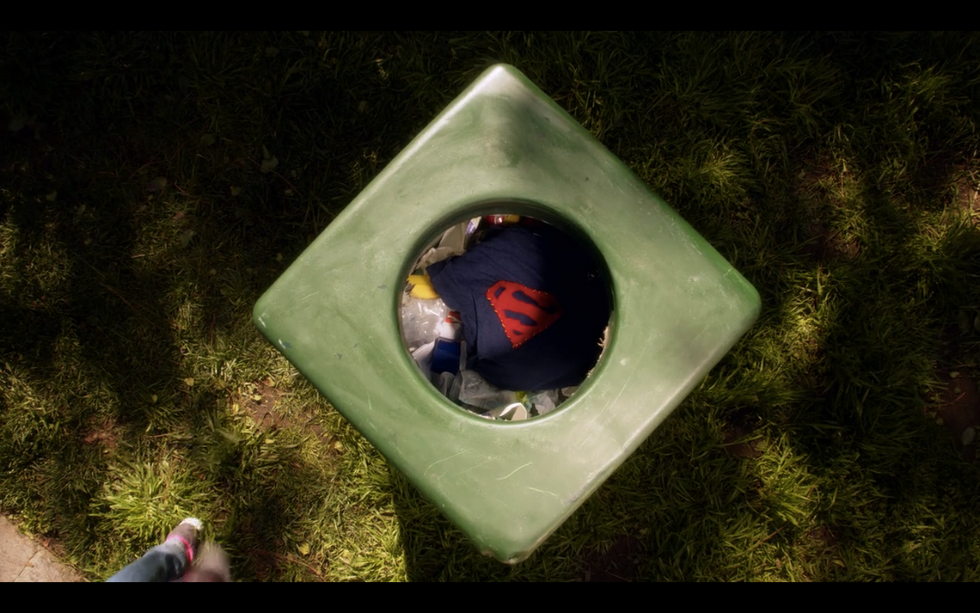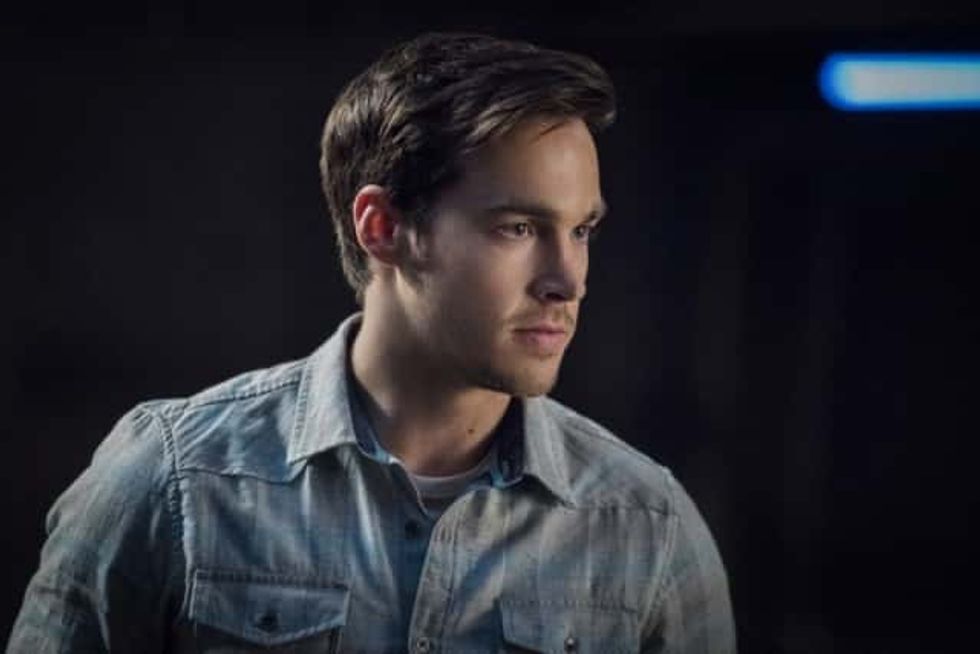I dressed as Supergirl for Halloween back in 2015. The show had just aired, but I already loved it and was excited to see where it would take its titular character. I'd known Supergirl existed, but I wasn't much of an avid comic reader and the only other form of mainstream media she'd starred in up to that point was a critically-panned 80s film. Finally, we had a properly fleshed-out female counterpart to the iconic Man of Steel, and she was pretty damn feminist. I wanted the costume to be as accurate as possible, so I bought it piece by piece rather than by a regular licensed costume. I bought a cheap shiny red cape, but I wasn't satisfied with the bright color or the ties in the front, so I bought a darker red fabric and hemmed it to make my own cape, one closer to what she wears on TV. I may never claim to be a skilled seamstress, and I wound up getting superglue on my sports bra, but I was pretty happy with the way it turned out, and excited to rep my new favorite superhero.
Then, over a year later, I wrote a piece about the showand its use of alien characters as a metaphor for immigrants and minorities. In season one, it was cleverly woven in with human characters of color who faced prejudice, rather than setting the show in a world where our world's racism doesn't exist. James Olsen is frustrated with the image of black men as violent and aggressive, and Cat Grant calls a minor character out for being "a walking personification of white male privilege." Supergirl's messages spoke to young viewers who may have been new to learning about issues of social justice, and women and people of color had the biggest presence in the cast. The only white male protagonists I can recall are Winn, Jeremiah Danvers, and Zor-El (the latter two only played small roles in several episodes). The show spent those 22 episodes building up a relationship between Kara and James, and, as expected, they finally became a couple in the season finale. There had been some typical CW romance drama (they both dated other characters, they wasted time pining and dragging out the arc, etc.), but any major issues in their relationship were dealt with early on and in a healthy way. At one point, the showrunners knew how to portray a healthy relationship at the forefront of a diverse show.
Not so much anymore.
I'll admit, I was never extremely invested in Kara and James' relationship, but when they broke up in the season two premiere after little more than scheduling conflicts over when they would be able to go out together, I was already concerned over the state of the show. But hey, they added a gay woman of color and gave Kara's sister an arc about coming to terms with her sexuality and coming out to her loved ones. Lena Luthor was introduced to the cast, and she quickly became a fitting addition to the many dynamic female characters. On top of that, James Olsen got tired of just being friends with heroes and started fighting crime himself under the mantle of Guardian. That had to mean he would at least still have a major role in action sequences, and Alex Danvers' character would probably become more fleshed out. I definitely underestimated the writers' propensity to waste their characters' potential and do away with their development.
Yes, Alex began a healthy romantic relationship with Maggie Sawyer, and their personalities still work well off each other when they're not being wasted on typical relationship drama on par with Glee. But aside from the fact that Maggie is a Latina character being played by a non-Latina actress, their relationship may even work against the show, as having one healthy couple makes the toxicity of this season's main relationship all the more obvious. In short, most of season two's problems can be traced back to one conventionally attractive straight white man.
At first, I thought he'd be a decent new member of the team. A naive young alien who needs to learn the way things are done on Earth, as well as become a better person for knowing his new friends. But the writers were under the impression that he would have to start a relationship with their strong female lead in order to start respecting women and minorities, as if Kara would give him the time of day while he was all too happy to revel in his privilege. Mon-El is the very archetype that the entire first season existed to condemn - a man who objectifies women and garners praise when he starts doing something as simple as taking what they have to say seriously. The only thing he and Kara have that could pass for chemistry is a relationship based around constant bickering and disrespect, which of course means they're head over heels for each other! After all, it's perfectly normal for a man to have to be told by one of his male friends to listen to what his girlfriend wants instead of assuming he knows what's best for her, isn't it? And hey, he made her breakfast that one time to make up for months of lying about the fact that he was the heir to an oppressive slave-owning monarchy. Isn't that sweet?
All jokes aside, whatever redeeming qualities this season has are pushed aside every time by the ever-important cishet white man's half-assed character arc. Maggie and Alex's relationship has been reduced to cliché romantic drama that makes it feel less like an action-packed superhero saga and more like Glee, James has been all but written off the show, and M'gann, the only woman of color to have a recurring role in the season (Maggie is Latina, but played by a white actress), has been absent for the last several episodes.
Yes, I agree that Kara has far more chemistry with Lena Luthor than she ever has with Mon-El, but by no means does she have to be queer. What I believe has to happen is, if she must be in a relationship, that she be involved with someone who listens to and respects her, and, you know, isn't a former slave owner. Not only is this just a badly-written relationship, it's a badly-written relationship on a show aimed at families. Young girls look up to Supergirl, and they're taking in the choices she's making. Girls in middle school or high school are seeing this and could easily meet a boy who's cute enough, but rampantly disrespects them and treats them as someone of lesser importance just because they've been taught that they can. And in their eyes, Kara Zor-El has given him her stamp of approval. I'll still wear my Supergirl boots - they make me feel a little more empowered because they remind me of what she used to be. But until we get that Supergirl back, I'm hanging up my cape.









































